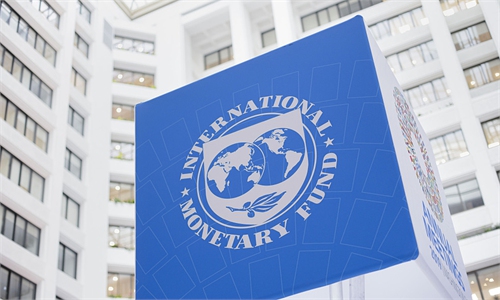

Signs for the IMF and World Bank fall meetings are seen inside the IMF headquarters in Washington, DC, US. Photo: VCG
At the IMF-World Bank Annual Meetings in Washington, DC, one of the key focuses was the need for major economies to strengthen macro policy coordination to address mounting economic pressures.Countries need to relearn how to work together, said IMF Managing Director Kristalina Georgieva while previewing the meeting on October 17.
"There is much that countries can do together as members of an integrated economic community, each benefitting from its own comparative advantage…Yet still, we live in a mistrustful, fragmented world where national security has risen to the top of the list of concerns for many countries. This has happened before - but never in a time of such high economic co-dependence," she said.
Indeed, a major issue in the world today is policy dissonance. This lack of coordination isn't merely a result of random chance; rather, it is largely a product of deliberate actions.
The measures taken against China by the US government over the past years are a prime example, including concerns over trade deficit, accusations of "currency manipulation," critique of China's economic growth model and ultimately sanctions imposed on Chinese companies, among other items on an endless list.
The moves are deliberate US attempts to create discord, continually escalating trade issues to disputes over growth models, then moving on to conflicts over technology, ideologies and even civilizations. It is deeply troubling that Washington has not corrected those misguided approaches.
The global economy is in a prolonged downward cycle, and it's premature to claim that we've hit rock bottom or entered an L-shaped recovery, as further declines are possible. This underscores the need for all countries to strengthen policy coordination.
As the world moves toward an increasingly digitalized economy, digital technology is what binds the world together. It is inherently neutral, and some countries excel in certain areas, while others have their own strengths in other domains. Opting to embrace de-globalization would be regressive, ultimately harming all parties involved.
While the US is reportedly set to impose restrictions on artificial intelligence investment in China and the European Commission announced on October 4 that it passed a vote to impose punitive tariffs on Chinese battery electric vehicles, Apple CEO Tim Cook visited China in recent days.
In his meeting with China's Minister of Industry and Information Technology Jin Zhuanglong, Cook said that Apple is keen to seize the opportunities presented by China's opening-up, and Apple will continue to increase investment in the country, contributing to the high-quality development of the industrial supply chain.
It is clear that businesses are adopting a more moderate stance, in contrast to some Western governments and non-governmental organizations. The businesses are less influenced by ideology and tend to follow market dynamics.
In more than 40 years, China has enjoyed the rewards of reform and opening-up, experiencing the benefits of globalization. By opening up its colossal market, China continuously shares the dividends of its development with the rest of the world.
China's partnerships with South America, Africa, Southeast Asia and many Eastern European countries have been quite successful. In particular, Africa - home to about 1.4 billion people - will emerge as the third wave of growth for humanity, following China and India. This is, to some extent, a testament to the success of China-Africa cooperation.
China has long been a strong proponent of multilateralism and globalization. While some politicians in the US and the West are trying to push for de-globalization or so-called "decoupling," they cannot change the trajectory of human development.
China should continue to strengthen win-win cooperation with Africa, South America and Southeast Asia, while also working with constructive global partners in Europe and North America. At the end of the day, this strategy will prove to be the correct and insightful one.
The author is an economist and professor at Peking University. bizopinion@globaltimes.com.cn


